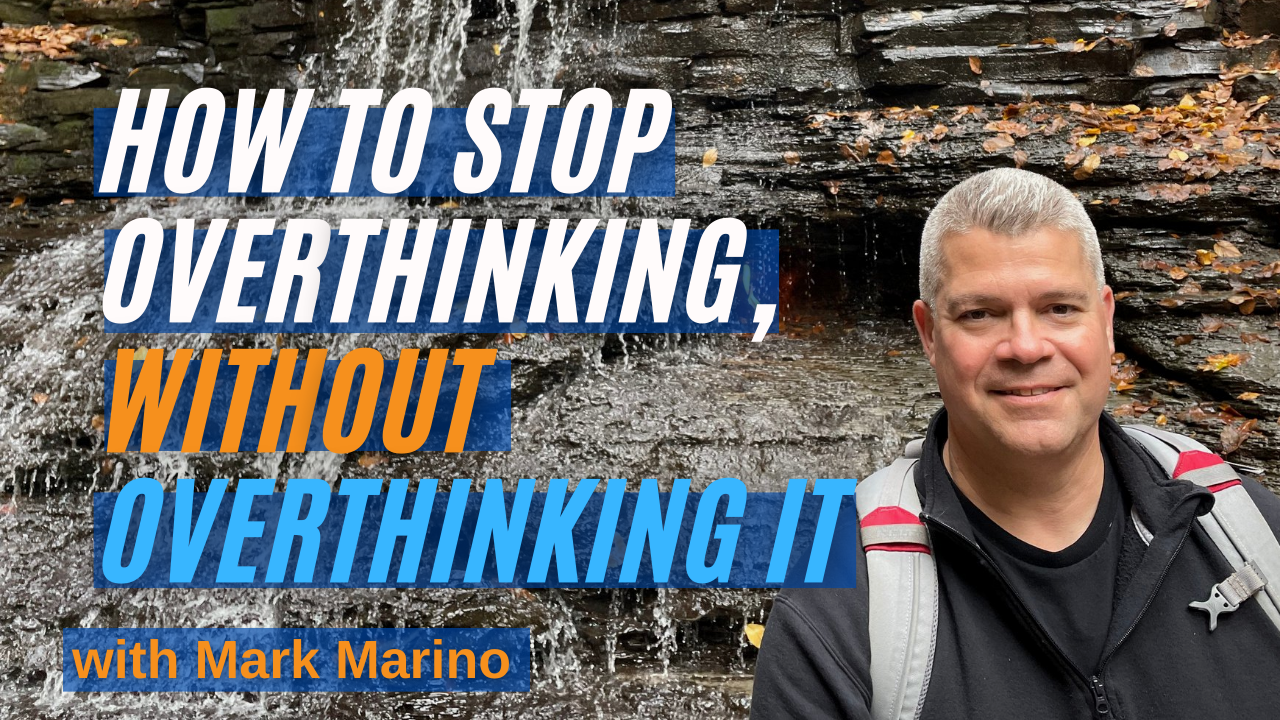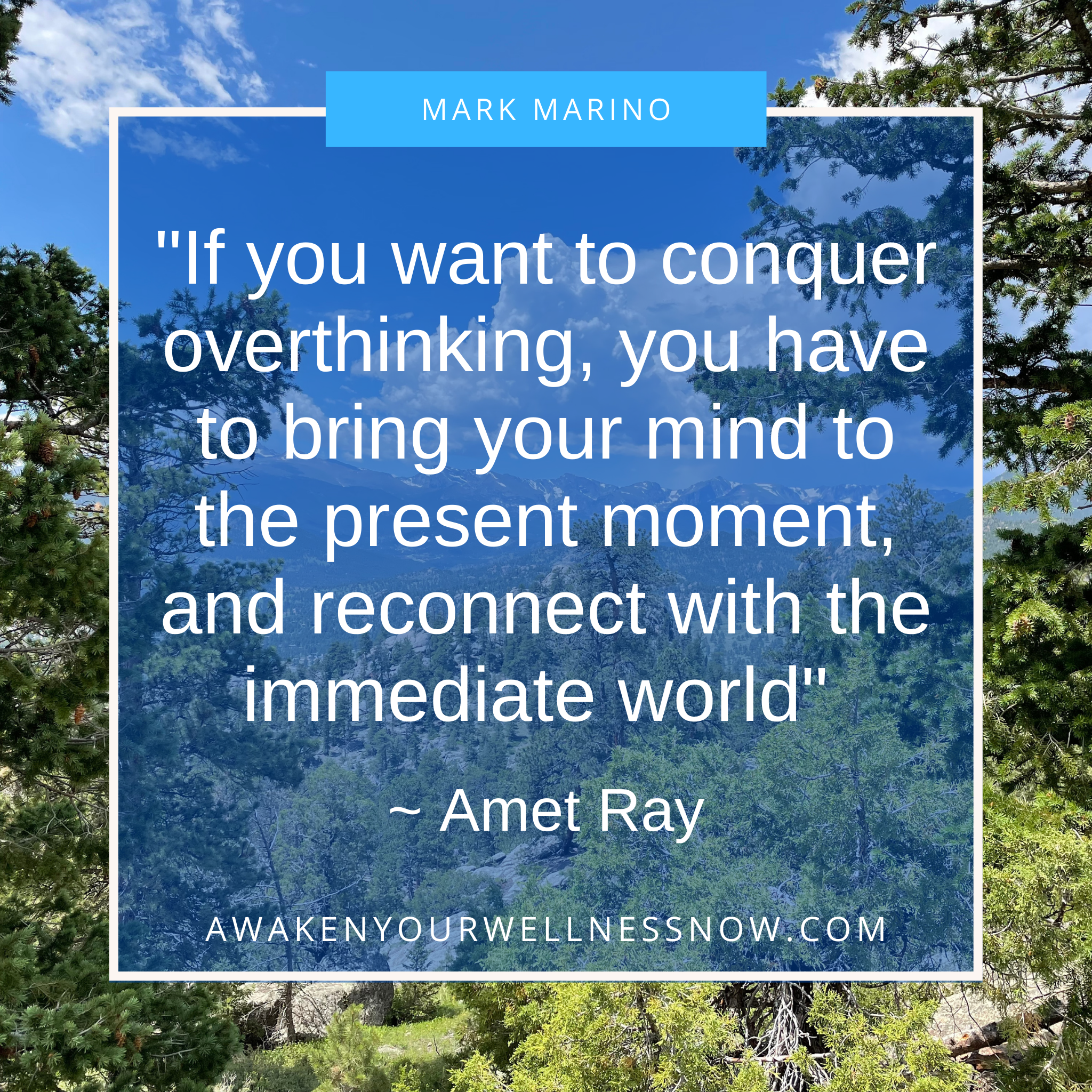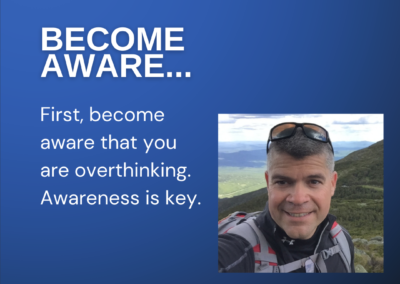How To Stop Overthinking Without Overthinking It
John Maxwell said, ….“Good thinking can do many things for you. It can help you solve problems. It can create new opportunities and it can take you to a whole new level, both personally and professionally.”
Now overthinking on the other hand; we know what that can do sometimes.
So today I’m going to discuss how to stop overthinking without overthinking it.
Overthinking is defined as…
…To think about something too much, or to put too much time into thinking about, or over-analyzing something in such a way that it’s not helpful, or could even be harmful to you.
Now, I think we’ve all heard about the paralysis of analysis when we overthink something way too much or more perseverating on something so much that’s happened in the past that it starts to cause a problem. Or the “what ifs” or the “should haves” or the “could haves”.
This can cause stress and anxiety and other problems like procrastination, or pessimism, or relationship problems, or self-esteem issues, and even loss of production at work.
Now it was Amet Kalantri that said,
“When You overthink, You Originate Problems Where None Existed Before.”
And it’s not just the people who say they have anxiety that are overthinkers.
There was a study done that said 57% of women and 43% of men said that they were overthinkers. And that 73% of people from 25 to 35 were overthinkers and 55% of 45 to 55 year olds were overthinkers. Now that’s a lot.
They also found that fear was one of the most common motivating factors when it came to overthinking fear of making a big mistake. If they didn’t thoroughly think things through on a major decision. The Fear of looking bad in front of other people, the fear of loss, fear of rejection, fear of reprisal.
All these different fears that people had, that would cause people to overthink and ruminate over and over on things that could happen. Things that might happen if things went wrong.
Now it’s important to remember that overthinking is a behavior. Overthinking is not who you are, but a behavior that you’ve learned over time, and it’s become a habit. Very often, it’s developed when you’re young in response to possibly, what your parents have said to you over time, or the environment that you’ve been in. Therefore, overthinking is a behavior that you can change if you want and you can learn healthier ways to manage your thoughts and improve your ability to make good decisions.
Now, it’s normal to think thoroughly through major decisions and any decisions that you have in your life. But the problem comes in is when you can’t turn your mind off. When you worry about all the things that could happen, there’s a tendency to catastrophize about all the, “what ifs” and what will happen if this happens and what will happen if that happens, or the tendency to ruminate about past traumatic events and what could have happened and what should have happened if this traumatic event didn’t happen to me.
And then you have sleepless nights because you can’t turn your brain off and the cycle goes over and over and over again.
So what are some of the things that you can do to stop overthinking without overthinking it?
One of the first steps you always hear me talk about is…
Becoming Aware and recognizing the fact that you are in this negative loop, that you are over-analyzing, and that you have this paralysis of analysis and that you’re in this cycle of overthinking and that you need to stop it.
Now, the second thing is to…
Reframe Your Story or your Thoughts or Beliefs about yourself.
You see, we tell ourselves stories all the time about what, who we think we are. Now. We say things to ourselves like; “well, I’ve always been an anxious person, or I always seem to be stressed, or I definitely have a tendency to overanalyze things”.
You see your brain focuses more on whatever you think about most during your day. So if you’re telling yourself this story, or if you have this belief about yourself, it will be set in stone that you’re anxious and stressed out and overanalyze.
So your brain will continue to overanalyze. And guess what? Overthink.
Now you can change the story and the narrative that you tell yourself, you can ask yourself empowering questions. You can focus on empowering thoughts that will help you to make decisions.
The next thing you can do is…
Be Present in The Moment, Be Focused On The Now.
We have a tendency to be anywhere but in the present. We’re focusing too much on past traumatic events. What could have been, or what should have been if this traumatic event didn’t happen to me or worrying about a future that hasn’t happened yet.
Amet Ray said, and I’m paraphrasing:
“If you want to conquer overthinking, you got to bring your mind to the present moment and reconnect it with the immediate world.”
The other thing you can do to stop overthinking is…
To Focus On Solutions To Challenges:
You see, when you’re focusing on the pain and problems in your life, there’s a tendency to ruminate and overthink about everything that’s going wrong in your life.
Take charge of your life. Let’s say you’re stressed at work. Figure out a way to change it at the workplace. If you can change it at the workplace, you may want to think about changing your job or career.
What about relationships? If your relationship’s not going well. Figure out how to be a better person for a stronger relationship.
Now, if you’re not happy with where you’re at or what your current situation is, set some new goals for yourself. This will give you purpose and direction and will give you something to work towards. And if you have goals, it gives you a better frame of reference from which to make decisions from. And if you have goals to work towards, there’s less of a tendency to overthink.
So again, let’s look at the four tips that I gave you to stop overthinking.
The first one is Become Aware or to Recognize that you’re in this negative loop of overthinking and that you need to reduce or eliminate this overthinking process.
The second tip was reframing your story or your thoughts and beliefs about yourself from negative, like I’m anxious and stressed, and over-analyzing to empowering thoughts that you are in control, that you can make healthy decisions in your life, which will help stop the overthinking.
The third tip was to be present in the moment to be focused on the now to decrease the amount of time that you’re overthinking about past traumatic events and worrying about a future that hasn’t happened yet.
And the fourth tip was to focus on solutions to challenges.
So do yourself a favor start using these four tips to stop overthinking. And I know you’ll see a positive, significant difference in your life
Well, I hope this information helped you out.
Be Positive, Be Motivated, Be Focused and Be Well,
Have a great day.
Mark
When you sign up to receive his blog updates via email.












